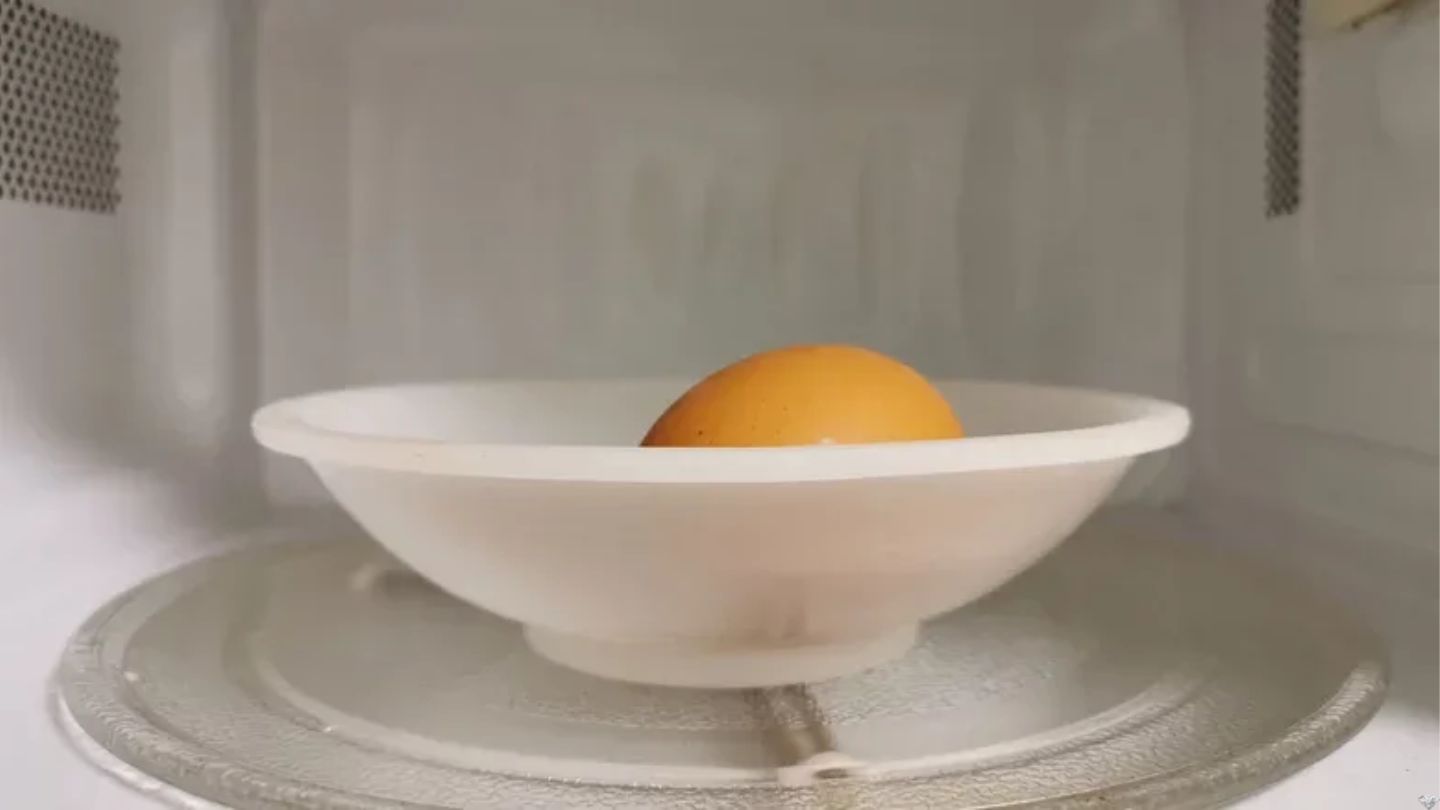How To Boil Eggs In Microwave?
Do you find it challenging to boil eggs the traditional way? Are you looking for a fast and efficient way to boil eggs without fussing around with messes on the stove? Well, look no further! Boiling eggs in a microwave sounds like a strange idea but is actually quite a simple process that can have delicious results. Not only does it save time and energy, but it also results in cooked eggs that are safe to eat and not overly overdone. Also, not only do microwaves reduce the tediousness of boiling multiple eggs on the stovetop, they also help you to create perfectly hard boiled eggs with no guesswork involved.
In this blog post, we will cover exactly how to boil eggs in a microwave – from determining the size of the egg to knowing how long the boiling will take. Whether you’re trying out a new recipe or preparing breakfast for yourself, learning how to boil eggs in your microwave is an essential skill every cook should acquire. So keep reading to find out exactly what you need to know about boiling eggs safely and correctly.

What is microwave?
Microwave is an electromagnetic wave with a frequency between 300 MHz and 300 GHz, which falls within the microwave band of the electromagnetic spectrum. It is used to transmit energy in various applications, such as communication, navigation, radar systems and cooking. Microwaves are non-ionizing radiation that does not cause damage to DNA or other living tissues at typical power levels. In cooking, microwaves heat food by agitating molecules in the material of the food itself. This agitation causes friction between particles, resulting in heat being generated within the food. The rapid heating process helps speed up cook times for many recipes compared to traditional methods. On top of that, using a microwave oven can help reduce energy consumption since it uses much less time than conventional methods.
History of microwaves
The history of microwaves can be traced back to 1888, when German physicist Heinrich Hertz was the first to discover that electromagnetic waves could be generated and transmitted. In 1904 British inventor Sir John Ambrose Fleming patented a device known as an oscillator which operated at microwave frequencies. However, it wasn’t until World War II that the first practical applications of microwaves began to emerge. During the war, radar systems used microwaves to detect enemy aircraft over long distances. After the war, researchers began experimenting with ways to use microwaves for communication purposes. The first commercial microwave oven was developed in 1947 by American engineer Percy Spencer while he was working on a new type of vacuum tube called a magnetron. The invention quickly gained popularity and by 1967, the first domestic microwave oven had been released. Since then, microwaves have become an integral part of our everyday lives. From cooking to communications and medical treatments, they offer a wide range of benefits that make them invaluable in many different applications. Today, microwaves are used more than ever before as technology continues to advance. Smartphones use them for wireless communication and some newer cars even come with built-in navigation systems that rely on microwaves to function properly. As the demand for faster and more efficient means of transmitting energy increases, it is likely that microwaves will continue to play an important role in our lives for years to come.
What are eggs?
Eggs are an oval-shaped reproductive body produced by female birds and some other animals, including reptiles, amphibians, and fish. They are typically a rich source of protein, vitamins, minerals, and healthy fats. In the kitchen, eggs can be cooked in a variety of ways such as boiled, poached, scrambled or made into omelets. Eggs can also be used to make baked goods like cakes and muffins. Egg whites contain most of the egg’s protein content while the yolk contains fat and cholesterol. There are multiple types of eggs available on the market today such as cage-free, free-range and omega-3 enriched varieties. These specialty eggs offer additional health benefits compared to regular eggs due to their higher nutrient content. All in all, eggs are an incredibly versatile and nutritious ingredient that can be used to make a wide variety of dishes.
Can you boil an egg over a microwave?
Yes, you can boil an egg in the microwave. It is secure to state that the fastest technique to boil an egg is in the microwave. In only a few minutes, you can get a properly cooked hard boiled egg.
While warming, cooking, and thawing are the main uses for microwaves, they may also be used to boil eggs. Simply put the eggs in a bowl that can be used in a microwave and submerge them with water to use this approach.
Just heat on high for seven minutes, or until the food is cooked to your preferred doneness. If you want your boiled eggs to peel quickly, make sure you’re using fresh eggs because older eggs tend to cook unevenly in the microwave.
What will you need to boil eggs in the microwave?
To boil eggs in the microwave, you will need a bowl or mug that is safe to use in the microwave. You will also need some water and salt for boiling the eggs. It is important to note that the amount of water and salt you need may vary depending on how many eggs you are boiling at once. Additionally, it’s best to let the eggs cool before attempting to peel them as they can be quite delicate while hot. Finally, make sure that you watch your boiled eggs carefully while they’re cooking as microwaves can cook things differently than other methods such as boiling on the stove top. Once cooked, enjoy your hard boiled egg with a sprinkle of salt and pepper.
How to boil eggs in the microwave?
In fact, for some meals, microwaves are typically regarded as being more energy-efficient than conventional cooking techniques (including meats). They won’t burn from the exterior due to internal cooking.
So, the answer for the question “can you boil eggs in the microwave” is absolutely yes. But how to boil eggs in the microwave? Here is a step by step instruction for people to follow:
Step 1: Put the number of eggs you want in a deep bowl with the right amount of water.
For one egg, the water should be enough to cover it totally.Add 1 teaspoon of salt for every cup of water used.
Step 2: Place the bowl in the microwave and heat it up for 3 minutes on high power level.
Actually, the time to boil bases on the number of eggs you want to boil. This should be adequate if you are only cooking one or two eggs. However, it’s ideal to cook many eggs in different basins so that they don’t overlap during cooking and produce unevenly boiled yolks.
Step 3: Take out the bowl and check if the eggs are boiled or not. If they’re done to your liking remove them from the bowl with a spoon and place them in cold running water for cooling down. After that you can leave them to cool completely before peeling off the shells or use warm water instead if you plan on eating them immediately.
Step 4: Once cooled, peel off their shells and enjoy your boiled eggs. If there are any leftovers, store them in the refrigerator.
You have successfully boiled an egg in the microwave. Enjoy your freshly cooked eggs with a sprinkle of salt and pepper. With this simple technique, you’ll be able to make perfect boiled eggs every time.
How long does it take to boil eggs in the microwave?
This depends on the number of eggs that you are cooking. Generally, it takes about 3 minutes to boil one egg in the microwave and up to 8 to 10 minutes for more than four eggs. Additionally, make sure to monitor your boiled eggs while they’re cooking as microwaves can cook things differently than other methods such as boiling on the stove top. To keep your boiled eggs from becoming overdone or rubbery, be sure to set a timer and check them often. When they are done to your liking, remove them from the bowl with a spoon and place them in cold running water for cooling down before peeling off the shells or eating them immediately.
How do I peel the eggs?
Once the eggs are cooled, you can peel them by gently tapping them on a surface to crack the shells. Then start peeling from the large end and go around in circles until all the shell is gone. You may need to use a butter knife or spoon to help remove any stubborn bits of shell. If you find it difficult or time-consuming to peel your boiled eggs, try adding some baking soda to the boiling water before putting in the eggs – this will make it easier for you to peel off their shells quickly and effortlessly. And if you’re looking for an even quicker way of peeling your boiled eggs, make sure you’re using fresh eggs as older eggs tend to cook unevenly in the microwave. With these tips and tricks, you can make the perfect boiled eggs in no time. Enjoy your perfectly cooked and peeled boiled eggs with a sprinkle of salt and pepper. With this simple technique, you’ll be able to make delicious hard-boiled eggs every time.
What not to do when boiling eggs in the microwave?
There are some things people must remember to avoid doing while boiling eggs in the microwave:
1) Avoid poking the eggs: when you poke a hole in the egg, it can cause the whites and yolks to leak out, leading to unevenly cooked eggs.
2) Don’t cook too many eggs at once: if you’re boiling more than four eggs at once, make sure to cook them in separate bowls so they don’t overlap during cooking and produce unevenly boiled yolks.
3) Do not overcook: as mentioned before, microwaves can cook things differently than other methods such as boiling on the stove top. To keep your boiled eggs from becoming overdone or rubbery, be sure to set a timer and check them often.
4) Avoid using metal containers: metal containers are not suitable for microwave usage especially when cooking foods such as eggs. This is because the metal container can cause sparks to form and may even damage your microwave.
5) Do not leave the eggs in the bowl after cooking: once the eggs are done cooking, remove them from the bowl with a spoon and place them in cold running water or warm water if you plan on eating them immediately.
6) When cooling down your boiled eggs, don’t jiggle or jolt them around: this can cause the eggshells to crack, which will make it difficult for you to remove them later.
By following these tips and tricks, boiling eggs in the microwave is an easy and convenient way to prepare delicious hard-boiled eggs every time! So go ahead and give it a try – your taste buds won’t regret it.
What should I do when boiling eggs in the microwave?
There are some things people should do to get boiled eggs delicious from a microwave.
1) Do use a large bowl: it is best to cook your eggs in a larger bowl so that they have enough room to move around when cooking.
2) Do cover the bowl during cooking: this will help keep the heat inside, helping evenly cook and boil the eggs.
3) Do add some cold water or ice cubes before boiling: adding some cold water or ice cubes helps lower the temperature of the boiling liquid and prevents overcooking.
4) Do stir the eggs halfway through cooking: stirring them ensures even cooking and prevents any air bubbles from forming in-between yolks and whites.
5) Do remove the finished eggs quickly: once your boiled eggs are done, take them out immediately using a spoon or tongs and place them in cold running water.
These tips and tricks will ensure that you get a perfectly cooked boiled eggs each time
What are some tips for perfectly boiling eggs in microwaves?
Here are some tips to help you make perfect boiled eggs in the microwave:
1) Use an Egg-Cooking Rack: This will ensure that your eggs sit above the liquid, allowing them to cook evenly.
2) Add Water and Salt: Adding a little bit of salt to the water helps enhance the flavor of your eggs and also makes them easier to peel after cooking.
3) Set Timer Accurately: Different microwaves have different power levels, so it is important to set your timer correctly for optimal results.
4) Cover Bowl While Cooking: Covering your bowl during cooking will help keep steam from escaping, which helps speed up the boiling process.
5) Remove Eggs From Water Immediately: Once your eggs are done cooking, remove them from the water and place them in a bowl of cold water or an ice bath to stop the cooking process.
6) Peel Gently: To get perfectly peeled hard boiled eggs, gently tap the egg against a countertop or work surface before peeling it.
How should boiling eggs be stored?
Once you have boiled your eggs, it is important to store them properly so that they stay fresh and safe to eat. Here are some tips on how to store boiled eggs:
1) Refrigerate immediately after boiling: Once the eggs have cooked, take them out of the water and place them in an airtight container before placing them in the refrigerator.
2) Eat within a few days: Hard-boiled eggs can be kept in the refrigerator for up to five days, but it is best to consume them within two or three days for optimal freshness.
3) Discard any cracked shells: If there are any cracked eggshells, discard those as they may lead to contamination or spoilage.
4) Peel eggs before storing: If you plan on eating the boiled eggs later, it is best to peel them before storing. This will help keep bacteria from forming and make them easier to eat when the time comes.
Following these tips will ensure that your boiled eggs stay fresh and safe for consumption.
What should I do if the eggs explode?
Although it is not a common occurrence, eggs may explode when cooked in the microwave due to the high heat and steam buildup. To prevent this from happening:
1) Use only cold water: Start with cold water to help reduce the chances of your eggs exploding.
2) Pierce shells before boiling: Piercing the shell helps release steam pressure during cooking.
3) Cover bowls while cooking: Covering the bowl during cooking prevents steam from escaping and avoids explosions.
4) Don’t overcook: Always keep an eye on your eggs and make sure not to overcook them as this can lead to explosions.
5) Don’t reuse water: Reusing water for multiple batches of eggs could cause explosions as the steam pressure builds up.
By following these tips, you can help avoid any potential explosions and have perfectly cooked boiled eggs every time.
FAQs
How do you determine whether a cooked egg is bad?
There are a few signs that can indicate whether your boiled egg has gone bad or not. Here are some ways to tell if your boiled eggs have gone bad:
1) Check the color: If you see any discoloration on the eggshell, it’s likely that your egg has spoiled and should be discarded.
2) Check the smell: If there is an unpleasant odor emanating from your egg, it’s best to throw it away.
3) Check for mold or slime: If there is any mold or slimy residue on the surface of the shell, discard immediately as this can be a sign of spoilage.
4) Shell cracks easily: If the shell seems unusually brittle and cracks easily when tapped, the egg has likely gone bad and should be discarded.
By following these tips, you can tell if your boiled egg has gone bad and take the necessary precautions to avoid foodborne illness.
How many eggs can be boiled without the shell adhering?
One of the common complaints when boiling eggs is that the shells can stick to the egg after cooking. To avoid this from happening:
1) Use enough water in the pot: Make sure there is at least two inches of water above the top of your eggs for optimal results.
2) Add a pinch of salt or vinegar to the water: Salt and vinegar help keep the whites intact during cooking, so adding a pinch of either will do the trick.
3) Don’t use old eggs: Old eggs are more likely to have degraded membranes, which can make them more prone to sticking.
4) Gently lower eggs into boiling water: Lowering your eggs gently into boiling water helps reduce cracking and sticking.
5) Allow eggs to cool in an ice bath: After boiling, immediately placing the eggs in a cold water bath can help keep them from sticking.
By following these tips, you can ensure that your boiled eggs don’t stick to the shell after cooking.
Why are eggs so challenging to peel?
Eggs can be particularly tricky to peel after boiling, with some having more difficulty than others. Here are the most common causes of hard-to-peel eggs:
1) Age – Older eggs tend to have more difficulty peeling due to their brittle shells.
2) Inconsistent cooking temperature – Eggs cooked at a lower temperature may require more time, which makes them harder to peel.
3) Not enough water in the pot – If there is not enough water in the pot during cooking, it can lead to boiling and cause the shell to stick.
4) Not letting eggs cool completely – If you try to peel an egg while it’s still hot, it will be much harder to do so. By following these tips, you can ensure that your boiled eggs are easier to peel and enjoy them without any problems!
Conclusion
Overall, boiling eggs in the microwave is an easy way to get perfect boiled eggs with minimal effort. Using the microwave to boil eggs is an easy, quick and efficient way of preparing them for any dish. Just make sure to watch your eggs closely, as microwaves can cook things differently than other methods such as boiling on the stove top, and be sure to let the eggs cool before attempting to peel them as they can be quite delicate while hot. With this simple technique, you’ll be able to make perfect boiled eggs every time. Enjoy!
References:
How to Boil Eggs: 14 Steps (with Pictures) – wikiHow
I’m Vance Douglas, and I love making pizza. In fact, I love it so much that I decided to build my own oven to make it in. It’s a brick oven that I made myself, and it’s the best pizza oven you’ll ever find.
Making pizza is a passion of mine, and I’m always looking for new ways to make it even better. I’ve been making pizza for years, and I continue to learn more about the art every day. My goal is to create the perfect pizza, and I’m getting closer and closer every time.



